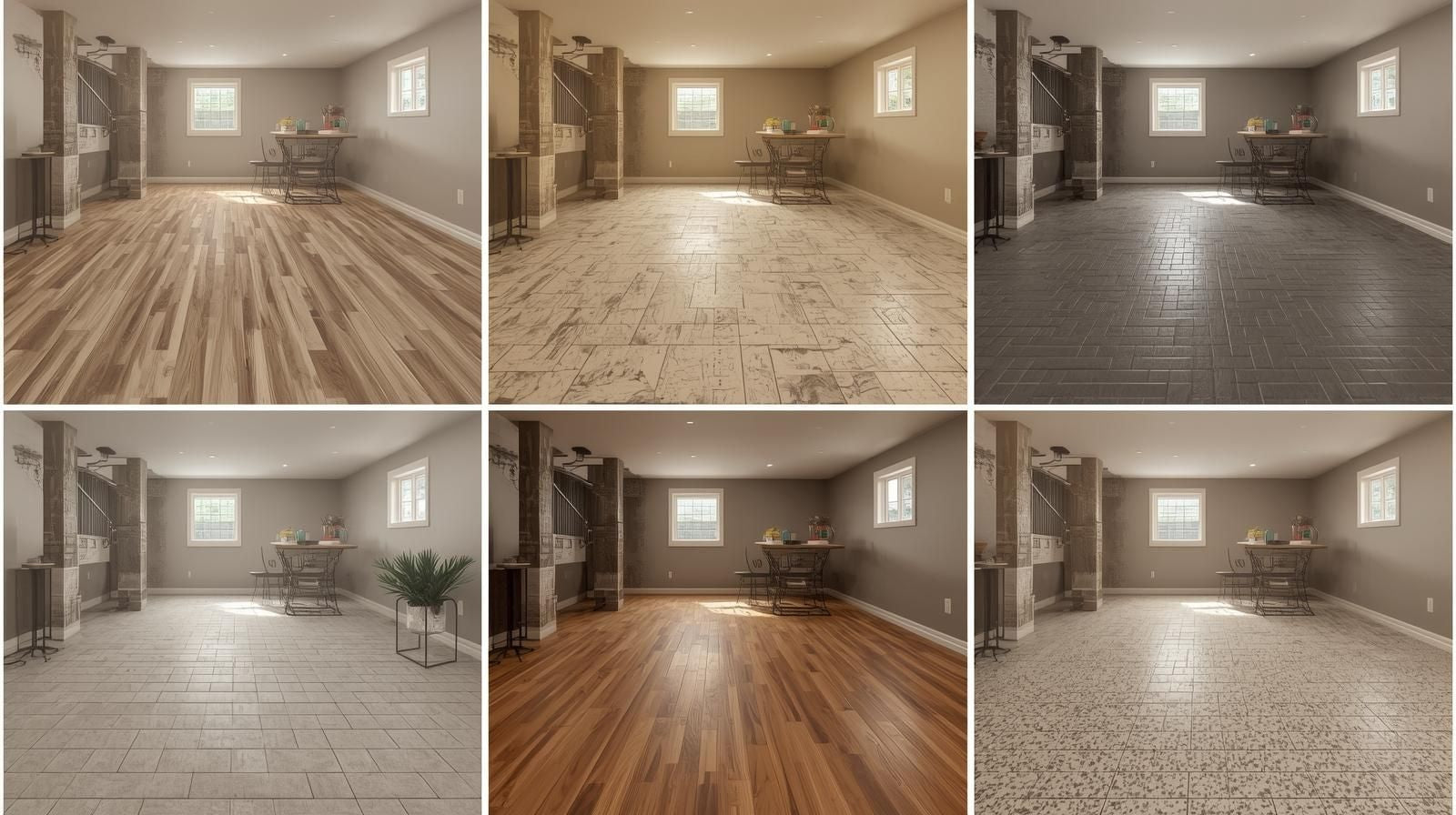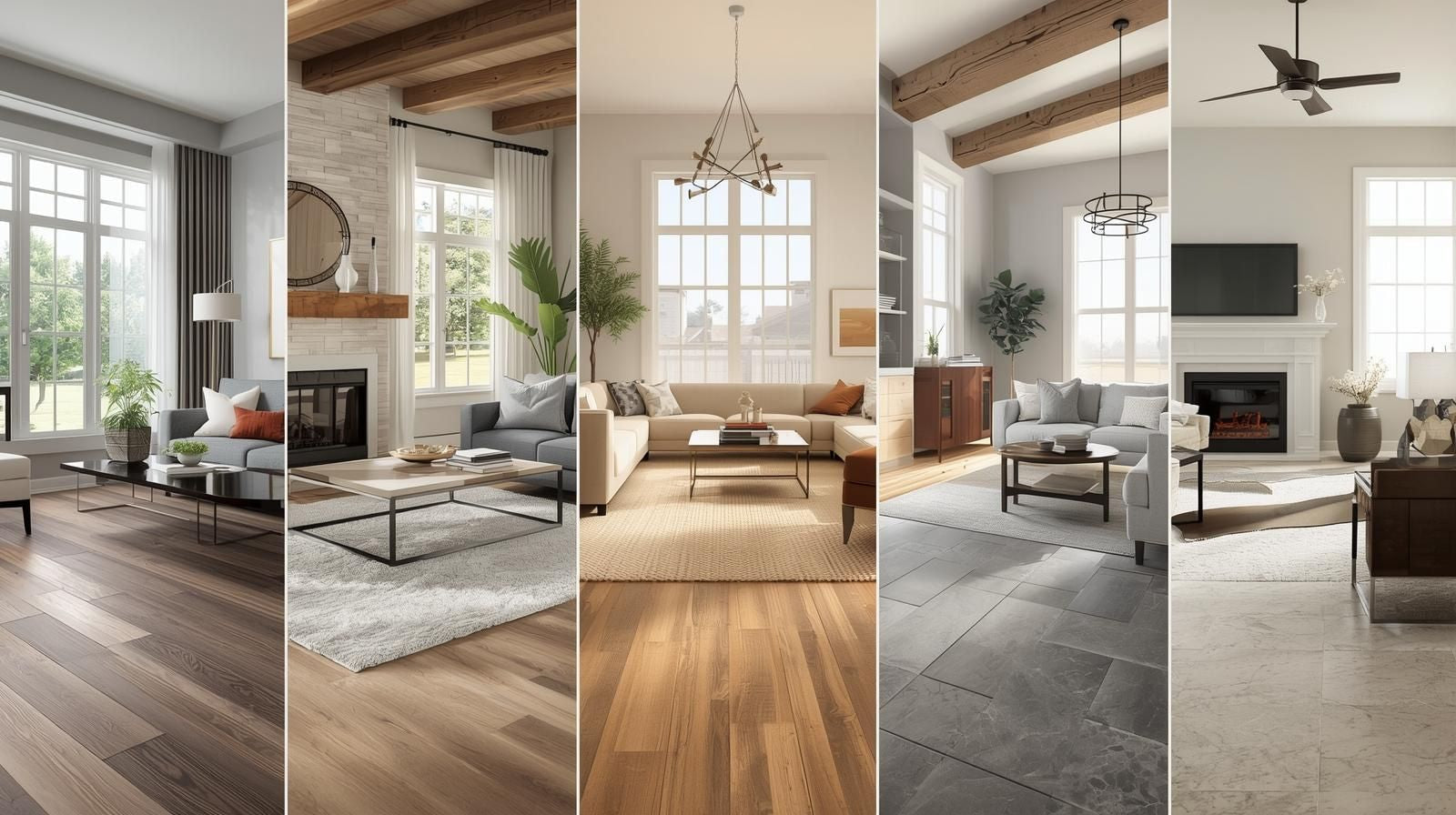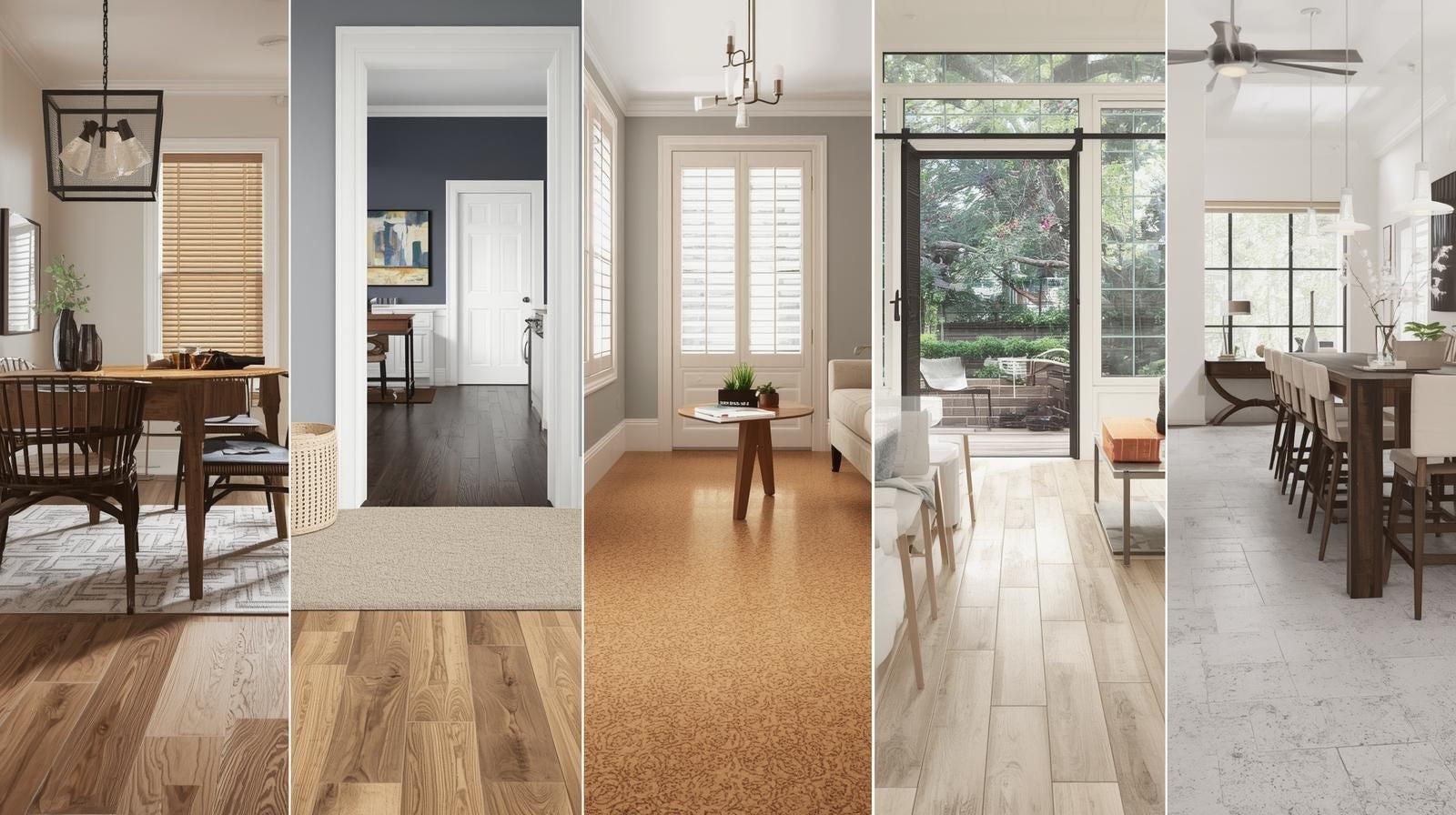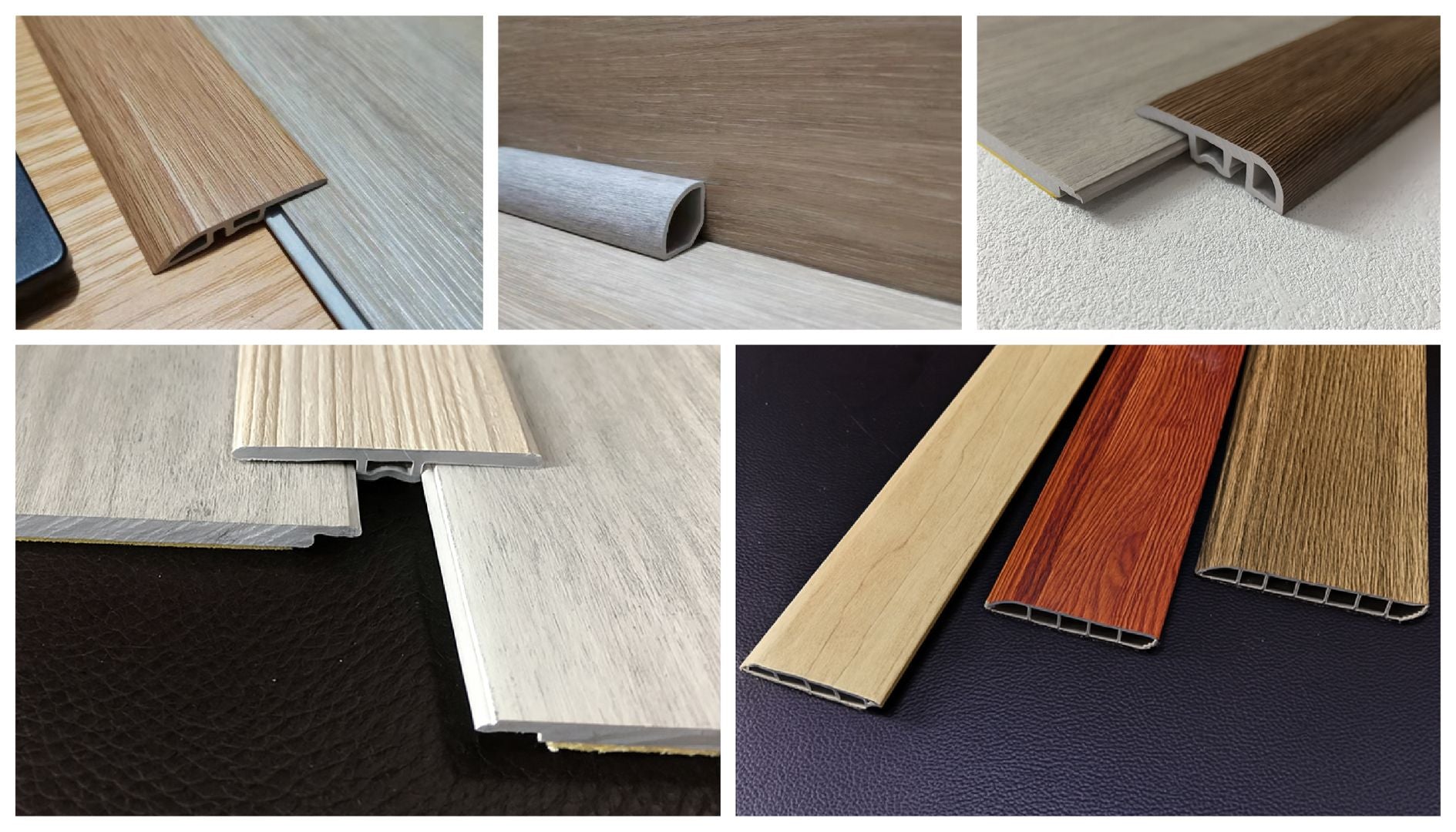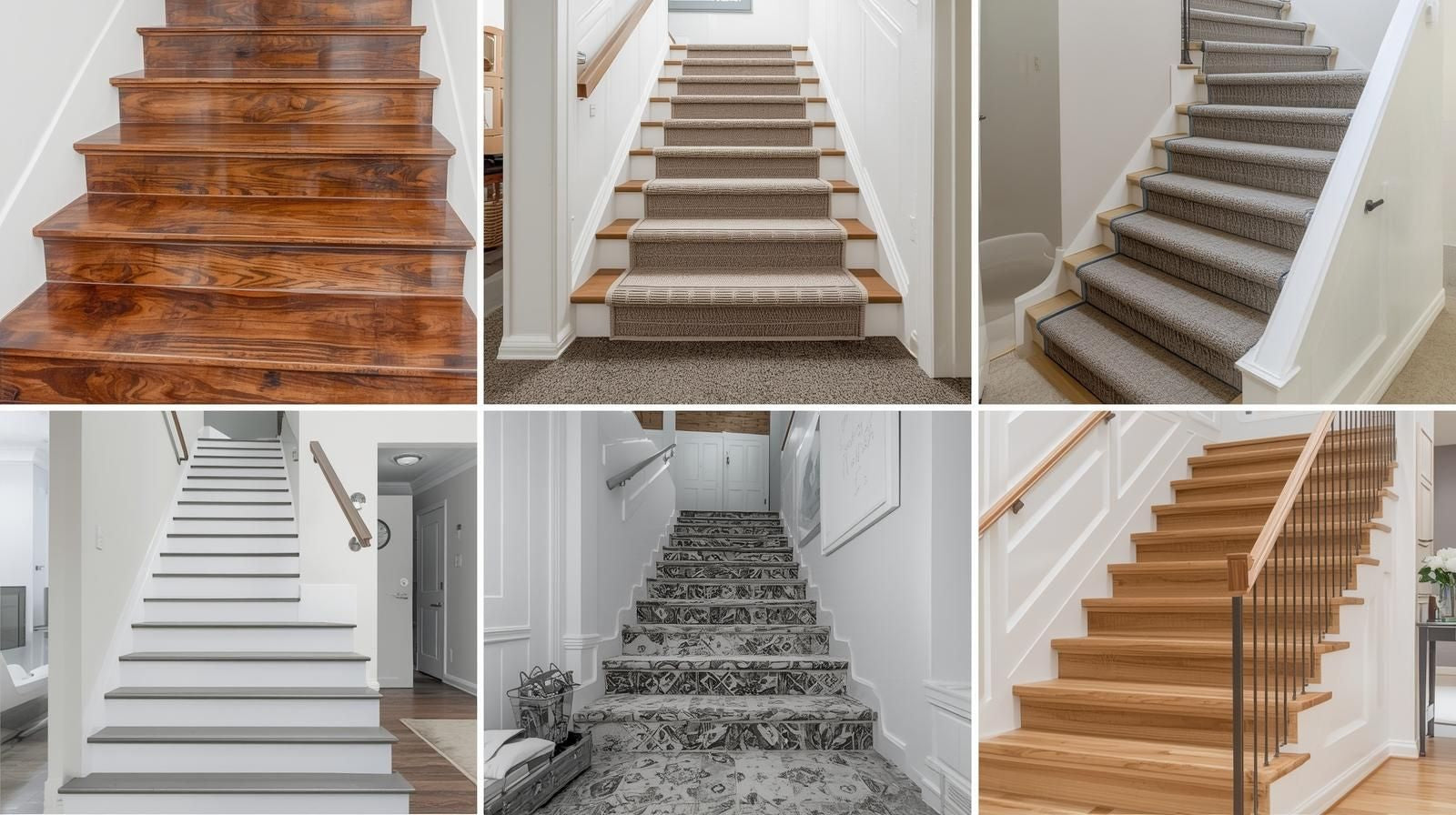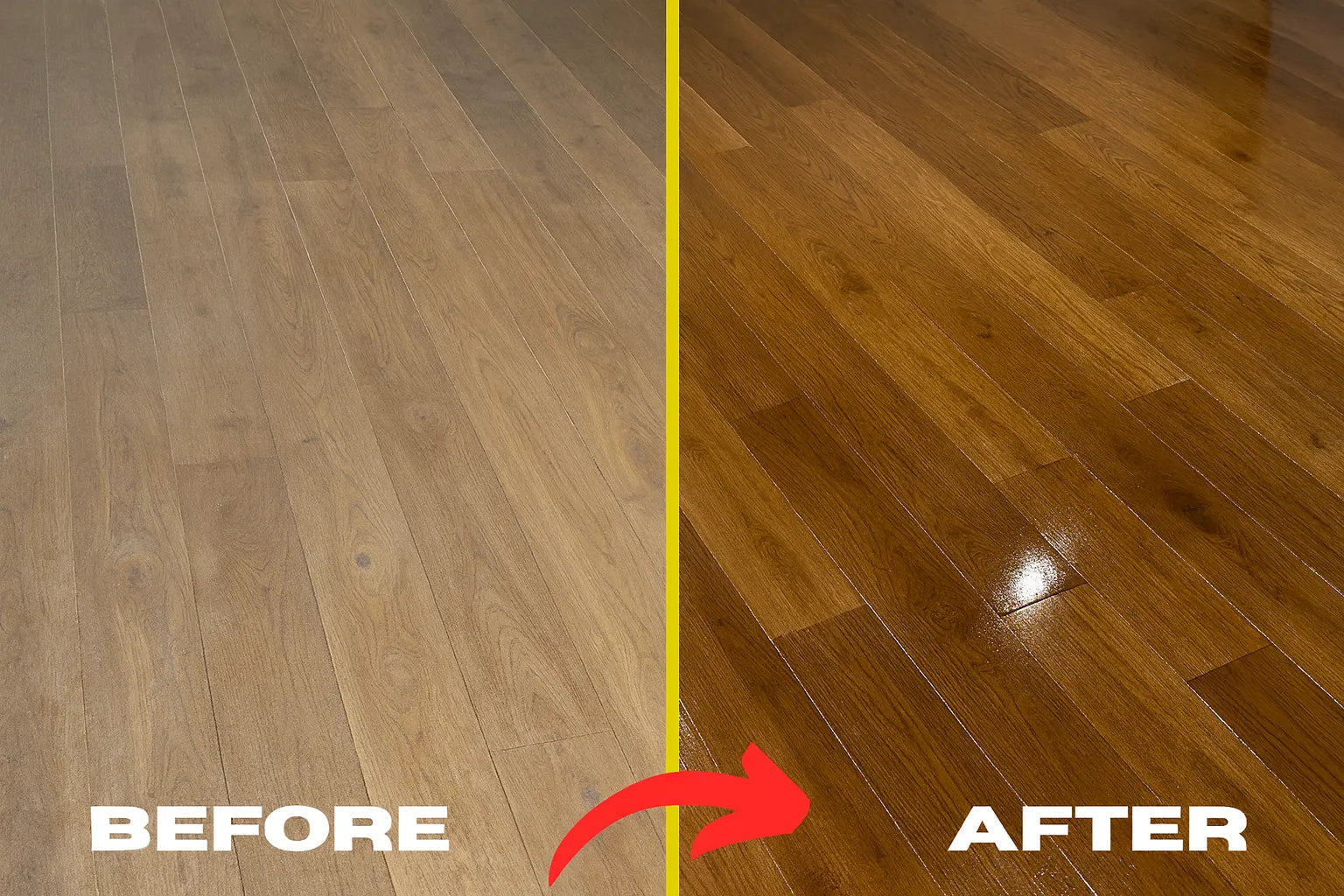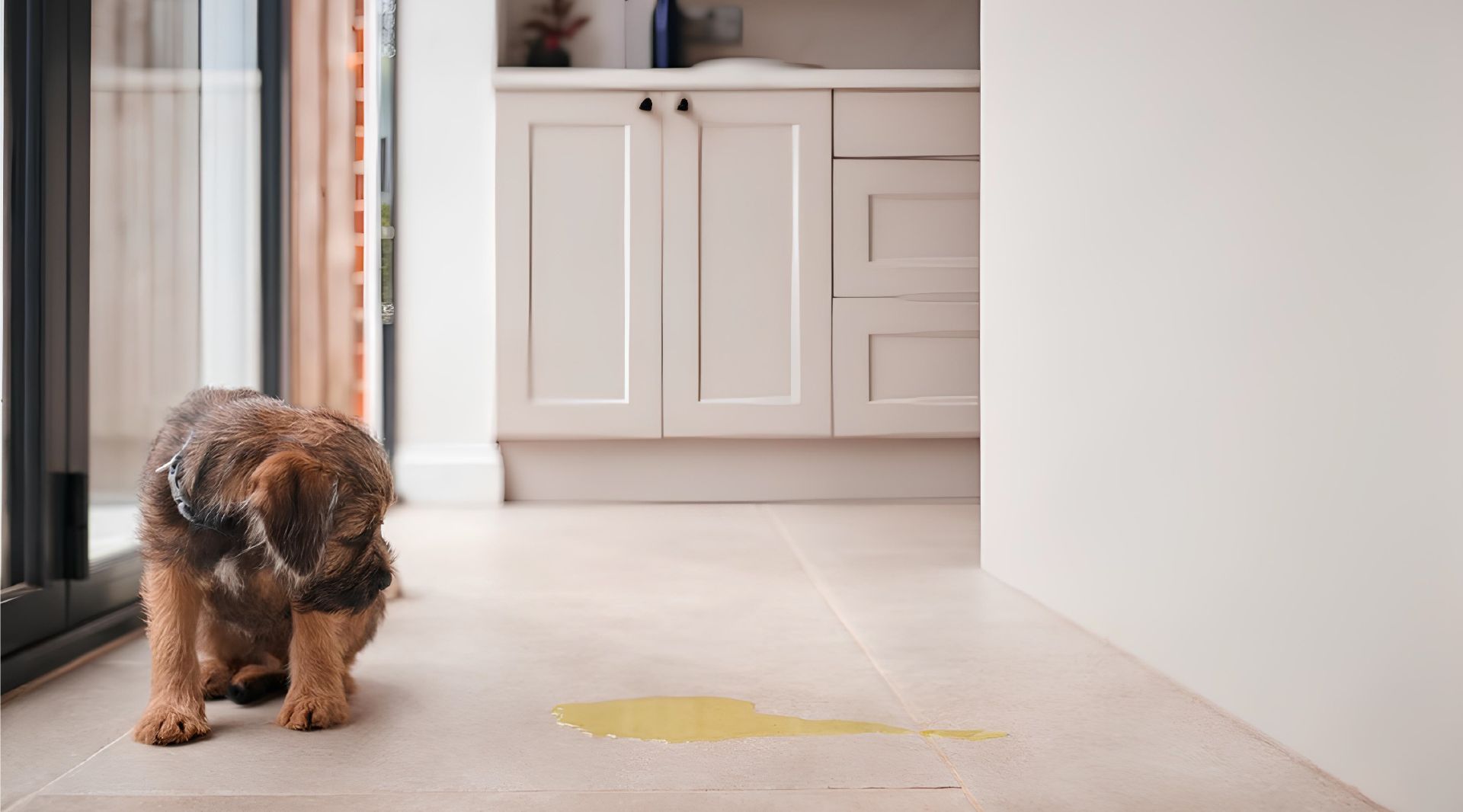When you’re finishing a basement, the flooring is one of the biggest decisions you’ll make, and if your basement sits on a concrete slab (like most do), the choice matters even more.
Concrete is hard, cold, and often holds moisture. And if you choose the wrong flooring, you’ll be dealing with warping, lifting, mold, or a floor that simply doesn’t last.
As a flooring retailer who has seen every type of basement flooring you can think of, I can tell you this:
The best floor for a concrete basement isn’t the one that looks nicest, but it’s the one that handles moisture, temperature changes, and the occasional surprise water situation.
This guide walks you through the top basement flooring options, how each performs over concrete, the pros and cons, estimated costs, and what I personally recommend depending on how you plan to use the space.
Quick List: Best Basement Flooring Options Over Concrete
- Luxury Vinyl Tile/Plank – Best Overall Choice for Most Basements
- Ceramic/Porcelain Tile – Best for High-Moisture Basements or Luxury Finishes
- Engineered Hardwood – Best for Homeowners Who Want a True Wood Look
- Laminate Flooring – Best Budget-Friendly Option
- Rubber Flooring – Best for Gyms and Kids’ Play Areas
- Epoxy/Polished Concrete – Best for Low-Budget or Industrial Looks
Why Basement Flooring Needs Special Consideration
Concrete slabs behave differently from upstairs subfloors. Before we talk about flooring types, you need to understand what makes basement floors tricky.
1. Moisture Isn’t a “Maybe” — It’s a Fact
Concrete absorbs, retains, and releases moisture. Even if your basement is dry today, the concrete below may still wick moisture upward. This affects:
- Laminate swelling
- Wood cupping
- Adhesives failing
- Mold under the floor
That’s why choosing a floor with proper moisture tolerance is non-negotiable.
2. Concrete Isn’t Always Level
Most slabs have high/low spots. Some flooring types hide imperfections well; others must have the slab leveled first.
3. Concrete Is Naturally Cold
Some floors feel colder than others. If comfort matters, you should know which materials trap or resist cold.
4. Flooding is a Real Risk
Whether it’s a sump pump failure, a broken washing machine hose, or heavy rain, basements can flood. Your flooring choice should consider that possibility.
Below is a realistic, experience-based breakdown of the top basement flooring types I recommend over concrete and those I would avoid.
1. Luxury Vinyl Tile/Luxury Vinyl Plank

Best for: Finished living areas, family rooms, or entertainment spaces
If you ask 10 flooring experts what they’d put in their own basement today, at least 8 will say waterproof vinyl floors. And with good reason, as it’s the ideal blend of durability, water resistance, cost, and appearance.
Why It Works Well on Concrete
- It’s fully waterproof
- It can go right over concrete with minimal prep
- Click-lock systems float, meaning no glue = fewer moisture issues
- It’s warmer and softer underfoot
- It handles minor slab imperfections
- Tons of wood and stone look available
- Long-lasting and cost-effective
Considerations:
- Make sure the concrete slab is dry and level before installation
- Moisture barriers or underlayment are recommended for added protection\
Cost: $2–$6 per sq. ft (material) | $2–$4 per sq. ft (installation)
If you want something that looks good, lasts, and doesn’t cause problems, choose LVP. It’s the safest, most reliable option for concrete basements.
Note: Avoid installing if your basement has a consistent history of flooding or leaks.
2. Ceramic/Porcelain Tile

Best for: Basement bars, bathrooms, or luxury finished spaces
Tiles are naturally waterproof and built to last. They’re installed directly over the slab using mortar and grout, creating a tough, moisture-resistant surface ideal for below-grade areas.
Why it’s great for concrete:
- Perfect match for concrete slabs, can be installed directly with mortar
- Excellent durability and water resistance
- Timeless, elegant finish that lasts decades
- Handles spills and humidity with ease
- Offers a clean, upscale look that lasts for decades
Considerations:
- Seal grout lines to prevent moisture seepage and mold growth
- Cold underfoot, so rugs or radiant heat help
- Proper subfloor leveling is essential to avoid cracked tiles or grout
Cost: $3–$10 per sq. ft (tile) | $5–$12 per sq. ft (labor)
A fantastic choice if you’re okay with a colder feel and a higher installation cost. Great for upscale basements.
Important: Tiles can be slippery when wet, so choose textured or matte finishes for safety.
3. Engineered Hardwood

Best for: Fully finished, dry basements with a premium aesthetic
Let me be clear: solid hardwood has no business in a basement. But Engineered Hardwood flooring? That’s different. Its layered construction makes it more stable, meaning it doesn’t warp as easily when moisture levels change.
Why it’s great for concrete:
- Authentic wood look and feel
- Adds insulation and comfort, making basements feel more like main living areas
- Can be installed as a floating floor over concrete with an underlayment
- More stable than solid Hardwood in varying humidity
- Compatible with radiant heating systems, adding extra warmth underfoot
Considerations:
- The slab must be completely dry and sealed
- Professional installation is often needed for the best long-term results
- Avoid installing near moisture-prone areas
Cost: $4–$10 per sq. ft (material) | $4–$6 per sq. ft (installation)
Engineered hardwood flooring is beautiful, but only choose this if your basement stays dry year-round and you’re willing to monitor humidity.
4. Laminate Flooring

Best for: Budget-friendly finished basements, playrooms, or home offices
Laminate has improved a lot over the years, especially the waterproof and water-resistant varieties. Modern waterproof laminate flooring is the best choice for concrete. It's cost-effective and resists moisture better, making it an affordable way to achieve a wood or stone look.
Why it’s great for concrete:
- Budget-friendly way to get a wood or stone look
- Easy floating installation with no glue or nails needed on concrete
- Durable wear layer resists scratches and everyday wear
- Improved waterproof options now handle basement humidity better
- Comfortable underfoot when paired with a good underlayment
Considerations:
- Always install a vapor barrier or waterproof underlayment for protection
- Avoid harsh cleaners that can damage the top wear layer
Cost: $1.50–$4 per sq. ft (material) | $2–$4 per sq. ft (installation)
Good budget option only if you choose waterproof laminate and your basement isn’t prone to moisture issues.
5. Rubber Flooring

Best for: Home gyms, workshops, or kid-friendly play areas
Rubber flooring tiles or rolls are durable, shock-absorbent, and moisture-tolerant. These features make it perfect for active spaces that need comfort and toughness.
Why it’s great for concrete:
- Excellent impact resistance and comfort
- Slip-resistant and easy to maintain
- Great noise and shock absorption
- Easy to clean and maintain, with simple tile or roll installation
Considerations:
- Can show seams if not installed properly, especially with tiles
- May discolor with sunlight exposure over time
- Not ideal for formal living areas due to its sporty or industrial appearance
Cost: $2–$6 per sq. ft
Note: New rubber flooring has to be aired out for a few days before use/installation to reduce the gym floor smell.
6. Epoxy/Sealed or Polished Concrete & Concrete Overlays

Best for: Minimalist, industrial-style basements or utility rooms
This is one of the most durable finishes you can put on a concrete slab. Instead of covering the slab, you enhance it with epoxy, sealant, or polishing, giving your basement a sleek, durable, low-maintenance finish that’s both stylish and budget-smart.
Why it’s great for concrete:
- Cost-effective and durable, as it uses the existing concrete slab
- Moisture-resistant when sealed properly
- Low maintenance and creates a modern look
- Extremely tough surface that resists stains, scratches, and heavy wear
- Can be customized with colors, flakes, or decorative finishes for style
Considerations
- Feels cold and hard underfoot, so rugs or mats may help
- Professional installation is often needed for a smooth, even finish
- Repairs or touch-ups can be tricky once the surface is finished
Cost: $3–$12 per sq. ft, depending on finish
Make sure to prep the surface and seal carefully. Moisture from below the slab can cause bubbling or peeling if not sealed properly.
FAQs
What is the most durable flooring for basements over concrete?
When installed over a subsurface like sealed concrete slab, both porcelain tile and luxury vinyl plank floorings stand against moisture, temperature extremes, and even outlive the test of time for decades.
Do I need a subfloor before installing basement flooring?
The majority of the time, floating floors such as those made from vinyl or laminate can be laid on top when you have smooth and moisture-controlled concrete. But some thin foam or cork underlayment would be a great source of insulation and body relief.
What flooring should I avoid in a basement?
Avoid solid hardwood, carpet without a moisture barrier, and cheap laminate.
Can I install flooring directly on concrete?
Yes. Vinyl, tile, rubber, and sealed concrete can all be installed directly.
What is the cheapest way to cover a concrete basement floor?
Paint, an epoxy coating, or peel-and-stick vinyl tiles are budget-friendly and can also be easily applied.
Choosing the Right Floor for Your Basement Over Concrete
So, if you pick the right basement floor, cold concrete can become a warm and beautiful space. Every choice has its own vibe:
- Vinyl style-led and tough
- Tiles combining class with strength
- Hardwood that adds warmth
- Laminate brings style without the splurge
- Epoxy and rubber keep things sleek and straightforward
The decision about the best flooring can come down to what the space will actually be used for – do you want a home gym, family hangout, or is it simply for extra storage? Once you know that, the flooring choice becomes much clearer.
Final Advice
If you’re choosing flooring for a basement over concrete, choose durability first. Moisture can ruin the wrong floor in no time. If you want long-lasting, low-maintenance, and good-looking, choose:
Luxury Vinyl Plank (LVP) — the safest bet for 99% of basements.
Good moisture control and preparation become the key to success in achieving great aesthetics and a dry basement, so opt for the waterproof flooring options. These other factors are just to be considered over the aesthetics for a balanced outcome.
Call me at (833) 378-4559 for a quick consultation on which flooring will best suit your space.


